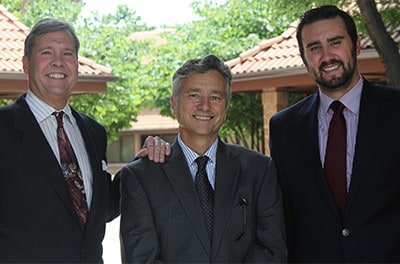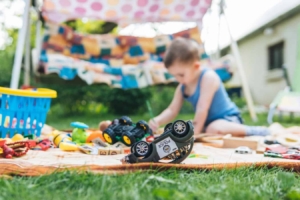How Car Accidents Affect the Children Involved
Car accidents can be terrifying for even the adults involved, but when children are present, the emotional distress they feel can be overwhelming and hard to understand, whether they were physically harmed or not.
If you’re wondering if a child can have PTSD (post-traumatic stress disorder) symptoms, the answer is yes. And oftentimes they come on later than you may expect. Today we’re going to tell you how you can identify PTSD in your child and what to do once it’s been discovered.
If Your Child Was in a Car Accident
Immediately following a car accident where a child is involved, the child should be taken to an emergency room or walk-in clinic to be checked for physical harm- that probably goes without saying.
However, what can easily get overlooked is how the child is dealing with the accident mentally and emotionally. Symptoms may sneak up on you (and the child) and can come out in several different ways:
• Nightmares
• Loss of confidence
• Anxiety and fear
• Crying
• Clinginess to parents/loved ones
• And many more
If your child is not getting better emotionally and showing signs that are out of the ordinary, it’s important that you get the child to his/her pediatrician or a doctor specific to handling emotional stress in children.
Note that even small accidents where no one was hurt, may cause stress in a child. The loud noises, what they witness, and the feeling of loss of control can weigh heavily on kids, causing depression and insecurities. If the child saw someone get hurt, that can have a long-lasting effect on them.
The sooner you get the child in front of a doctor, the better.
What to Look For in a Child After a Car Accident
Depending on the child’s age, there are a few things you can keep your eye on that we’ll list below, and you can also get valuable information at The National Child Traumatic Stress Network that will help guide you.
5 and under: Reverting to past behavior patterns such as bedwetting and thumb sucking, feeling anxious in the dark, scared to be alone or without a parent/loved one
6-11: Withdrawing, sleep issues including nightmares, being disruptive both at school and home, unable to focus, anxiety, physical complaints like bellyaches and headaches.
12-17: Sleep issues including nightmares, issues at school including a slip in grades and a rise in truancy, behavior issues, depression, anxiety, physical complaints like bellyaches and headaches, issues with friends or family members, engaging in risk-taking.
Once you notice these symptoms, take your child to a doctor so you can make the appropriate decisions on how to handle the newfound issues. Your doctor will be able to create a plan to best suit your child’s needs.
What Your Child Needs From You
While it’s difficult for any parent or loved one to see their child suffering, it’s important that you know how to reassure the child, allowing them to have the feelings they need to, and knowing that you will be there for support and comfort.
You can find insightful resources to help advise you on how to cater to a child suffering from PTSD online or contact your pediatrician for references.
Your child may be reliving the event internally and you’ll want to find out how to help them move through it as efficiently as possible.
Some things you can do immediately to help your child include:
• Showing the child he/she is safe
• Letting the child speak freely about what happened and what he/she is feeling
• Getting things back to a normal routine
• Providing more love and care
• Taking care of your own feelings and emotions
The Takeaway
After your child is in an accident, it’s super important to take them to a doctor to have them checked for physical injury. You should do this straight away, as you may not be able to see how the child was physically injured.
Be vigilant in following all of the medical advice you receive.
Look for signs of PTSD and be aware that those signs may not come up for months after the car accident. Should you see the signs, get your child to a doctor so he/she gets the proper treatment as soon as possible. Take full advantage of the resources to help you, your child, and the rest of the family get through the trauma.
Check with your car insurance to see if you have medical coverage for the physical and emotional treatment of your child. In most cases, this is covered under the personal injury protection (PIP) portion of your car insurance, no matter who’s at fault. If the PIP runs out and your child needs continued help, contact your medical insurance provider right away.
We’d like to note that your child should always be in the appropriate car seat for his/her age. Car seats, when used and installed correctly, are proven to reduce the risk of death and physical injury.
Many parents and caregivers believe their car seats are installed correctly; however, studies have shown that many times they’re not. You can find local resources to help with installation by searching here.
Northglenn personal injury law firms see far too many victims due to car accidents and it’s especially difficult when children are involved. If you have any questions or concerns about your car accident and its effects on your child, call Hull & Zimmerman today. Proudly serving North Denver, Northglenn, Westminster, Thornton, Commerce City, Arvada and Broomfield.
Contact our Northglenn Accident Attorneys
 If you or someone you love has been injured in any type of accident in Northglenn, Thornton, or anywhere in Colorado, and you believe someone else’s negligence is to blame, it is important to contact our experienced personal injury attorneys immediately. At Hull & Zimmerman, P.C., our committed personal injury lawyers are dedicated to the belief that everyone deserves justice. Contact us at (303) 423-1770 or (866) 385-3505.
If you or someone you love has been injured in any type of accident in Northglenn, Thornton, or anywhere in Colorado, and you believe someone else’s negligence is to blame, it is important to contact our experienced personal injury attorneys immediately. At Hull & Zimmerman, P.C., our committed personal injury lawyers are dedicated to the belief that everyone deserves justice. Contact us at (303) 423-1770 or (866) 385-3505.






